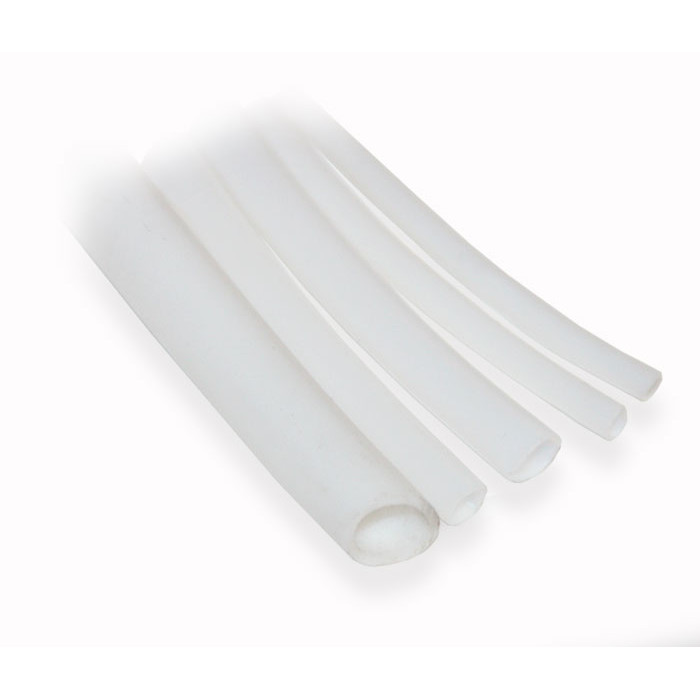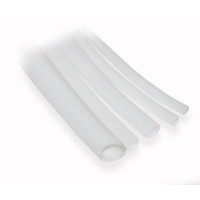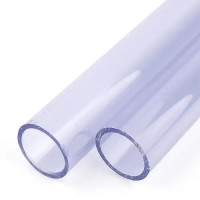PTFE tube internal diameter 2,1 mm wall thickness 0.4 mm - polytetrafluoroethylene - is obtained by polymerization of tetrafluoroethylene. Foreign analogues of F-4: teflon (USA), fluon (England), soreflon (France), agloflon (Italy), gostaflon (Germany), polyflon (Japan). In terms of chemical resistance, F-4 surpasses noble metals, enamels, and special steels. The most aggressive chemicals (acids, alkalis, oxidizing agents, solvents) have no effect on F-4 even at high temperatures. F-4 is affected only by alkali metal melts, their solutions in ammonia, chlorine trifluoride and elemental fluorine at high temperatures.
The use of fluoroplastics in friction units increases the reliability and durability of mechanisms, ensures stable operation in aggressive environments, high vacuum and cryogenic temperatures. High temperature resistance combined with excellent dielectric characteristics of the material allows it to be used in the electronics industry for the insulation of wires, cables, connectors, the manufacture of printed circuit boards, slot insulation of electrical machines, as well as in microwave technology.
It is used for the manufacture by mechanical processing of anti-friction, electrical insulating, chemically resistant and sealing elements of structures and mechanisms operating in aggressive environments at a temperature of -269°C to +260°C.
Pipes and tubes are produced from F-4D grade fluoroplast (GOST for material 14906-77) by paste extrusion followed by sintering. Features of extrusion molding make it possible to obtain hollow profile products with different wall thicknesses and practically unlimited lengths.
Fluoroplast-4D is a chemically inert non-combustible material with excellent electrical insulation properties, and these properties are maintained over a wide temperature range and are almost independent of humidity and current frequency.
Fluoroplast-4 pipes (TU 6-05-1937-82) are in demand in industry for the transportation of aggressive substances and highly pure process media. They are also used for lining steel pipes, fittings, wet parts of pumps, etc. The low coefficient of friction F-4D prevents the formation of deposits and clogging of pipelines, and the chemical resistance of the material provides resistance to corrosion.
Tubes made of F-4D (GOST 22056-76) are used as insulating sheaths of wires and cables, including those in chemically active environments. At temperatures from +20 to +150 C°, they remain resistant to all solvents of organic origin, alkalis and acids in any concentration, and do not lose their dielectric properties even when they go beyond operating temperatures (from -196 to +250 C°).
The physical and chemical characteristics of a fluoroplastic round pipe allow it to be used in the following areas:
power supply - as an insulating device that can directly cover electrical wires or entire bundles of wiring (banding of bundles); the use of tubes for spot repairs and rewinding of installation wires, as well as tubing;
chemical industry and metallurgy - fluoroplastic products are used to create pipelines through which various chemicals are supplied under pressure, under conditions of significant vibration, etc. - especially pure, aggressive or having high temperatures (molten, vaporous, etc.);
the fluoroplastic tube is not suitable for supplying/transporting the following substances: pure fluorine, chlorine trifluoride and molten alkali metals;
medicine, pharmaceuticals - due to the gas transmission capacity, Teflon tubes are successfully installed as a temporary or permanent implant of blood vessels, plasma, etc.;
food production - the fluoroplastic tube does not have organoleptic properties (taste, smell) that can affect the good quality of products; here, compressed air or steam is supplied through Teflon pipelines for the implementation of certain technical operations, various components of food products, semi-finished products and finished products in liquid form (milk, juices, etc.).
A fluoroplastic tube, capable of deforming when exposed to high temperatures and taking the shape of the product it is worn on, is used as an insulating material. Heat-shrinkable tubes are used to create protected on-board electrical networks of cars.
This protection is absolutely hermetic, which is important in the manufacture of, for example, equipment for geophysicists.
Fluoroplast is the most slippery of all polymers known in the world, it prevents chemicals and mixtures from sticking to the surface of a protected product.
Installation of PTFE pipes
Before starting installation and after welding, Teflon products should be subjected to hydraulic tests. They are carried out at a pressure of a liquid / gas flow one and a half times higher than the working (standard). The fluoroplastic tube is mounted into the system in the socket by welding.
The chemical resistance of fluoroplastic exceeds that of goldand platinum, The use of fluoroplastic pipes, therefore, a fluoroplastic pipe is used when working with concentrated alkalis, solvents, mineral acids, oxidizing agents, and petroleum products.
From fluoroplastic pipes, internal and external engineering communication systems can be laid.
In addition to high resistance to aggressive environments, PTFE pipelines have a number of other performance characteristics:
sufficient strength for existing applications;
good dielectric qualities;
the ability to maintain performance at extreme temperatures from -100C to +250C;
resistance to microorganisms;
a negligible resistance coefficient, due to which the fluoroplastic is listed in the Guinness Book of Records as the most slippery polymer;
small weight.
The areas of application of fluoroplastic pipes are limited by their increased gas permeability.
Modern industry produces fluoroplastic pipes with a diameter of 150-600 mm. Fluoroplastic lining of metal pipes is widely used.
The lining is called the technological process of processing the product with a special composition in order to protect it from the effects of aggressive environments. The application of a fluoroplastic layer up to 5 mm thick is carried out in a rotational way. The protective layer is seamless.
The connection of fluoroplastic pipes is carried out by an electric heater made in the form of pincers, which tightly cover the heated ends of the pipes. Welding is carried out in several stages.
Thin-walled fluoroplastic pipes are placed in the working space of the heating device, fixed with a pneumatic clamp. The connection zone, together with the clamps, is closed by the half rings of the external heater. A cylindrical mandrel fixed on the rod is placed inside the pipe.
A mandrel is also placed on the outer side of the pipe between its outer surface and the heater. The gap between the inner and outer mandrel is equal to the wall thickness of the welded PTFE pipes.
The heating time of the pipes is controlled by a time relay. After the joint has cooled and crystallized, the clamps open and release the welded pipes.
You can buy a PTFE tube internal diameter 2,1 mm wall thickness 0.4 mm from us at the most favorable price in Ukraine. A wide range of products allows us to quickly and efficiently fulfill any order, helping to complete any construction work on time.
No questions about this product, be the first and ask your question.



